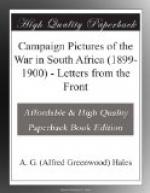The same good-looking young fellow with the curly beard bent over me again. “Feel any better now, old fellow?” I stared hard at the speaker, for he spoke like an Englishman, and a well-educated one, too. “Yes, I’m better. I’m a prisoner, ain’t I?” “Yes.” “Are you an Englishman?” I asked. He laughed. “Not I,” he said, “I’m a Boer born and bred, and I am the man who bowled you over. What on earth made you do such a fool’s trick as to try and ride from our rifles at that distance?” “Didn’t think I was welcome in these parts.” “Don’t make a jest of it, man,” the Boer said gravely; “rather thank God you are a living man this moment. It was His hand that saved you; nothing else could have done so.” He spoke reverently; there was no cant in the sentiment he uttered—his face was too open, too manly, too fearless for hypocrisy. “How long is it since I was knocked over?” “About three hours.” “Is my comrade dead?” “Quite dead,” the Boer replied; “death came instantly to him. He was shot through the brain.” “Poor beggar!” I muttered, “and he’ll have to rot on the open veldt, I suppose?”
The Boer leader’s face flushed angrily. “Do you take us for savages?” he said. “Rest easy. Your friend will get decent burial. What was his rank?” “War correspondent.” “And your own?” “War correspondent also. My papers are in my pocket somewhere.” “Sir,” said the Boer leader, “you dress exactly like two British officers; you ride out with a fighting party, you try to ride off at a gallop under the very muzzles of our rifles when we tell you to surrender. You can blame no one but yourselves for this day’s work.” “I blame no man; I played the game, and am paying the penalty.” Then they told me how poor Lambie’s horse had swerved between myself and them after Lambie had fallen, then they saw me fall forward in the saddle, and they knew I was hit. A few strides later one of them had sent a bullet through my horse’s head, and he had rolled on top of me. Yet, with it all, I had escaped with a graze over the right temple and a badly knocked-up shoulder. Truly, as the Boer said, the hand of God must have shielded me.
For a day and a half I lay at that laager whilst our wounded men were brought in, and here I should like to say a word to the people of England. Our men, when wounded, are treated by the Boers with manly gentleness and kind consideration. When we left the laager in an open trolly, we, some half-dozen Australians, and about as many Boers, all wounded, were driven for some hours to a small hospital, the name of which I do not know. It was simply a farmhouse turned into a place for the wounded. On the road thither we called at many farms, and at every one men, women, and children came out to see us. Not one taunting word was uttered in our hearing, not one braggart sentence passed their lips. Men brought us cooling drinks, or moved us into more comfortable positions on the trolly. Women, with gentle fingers, shifted




